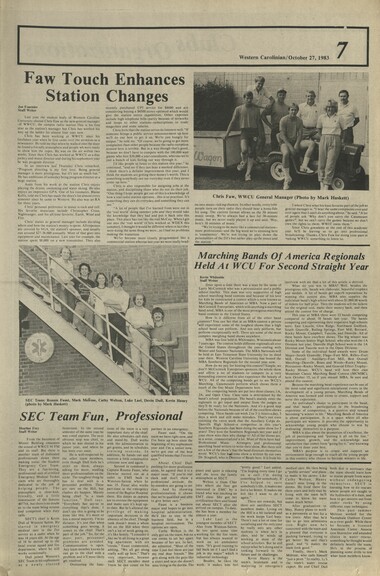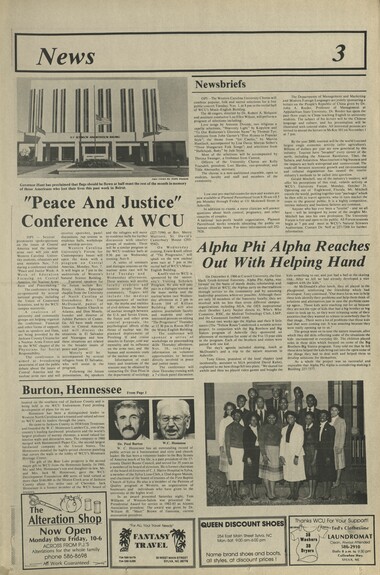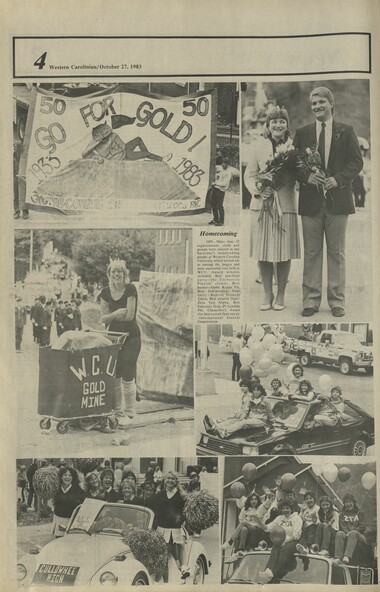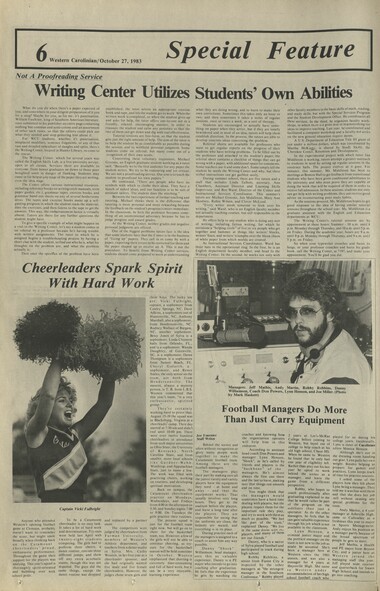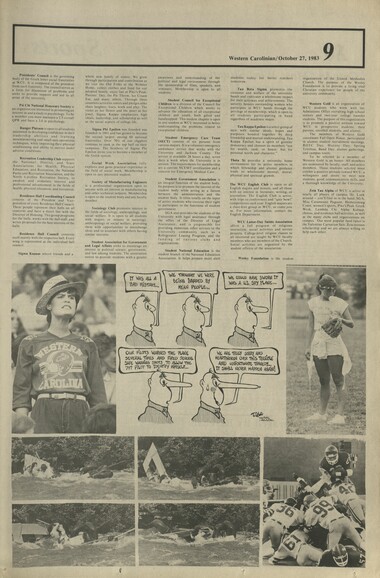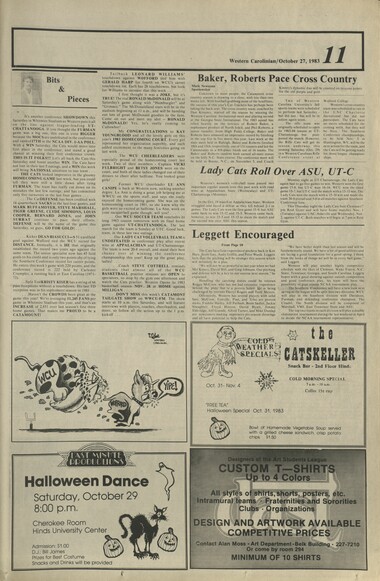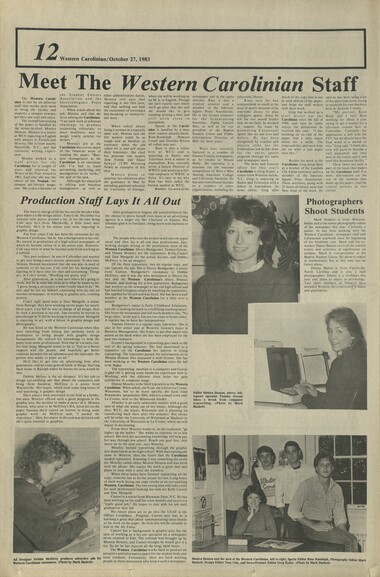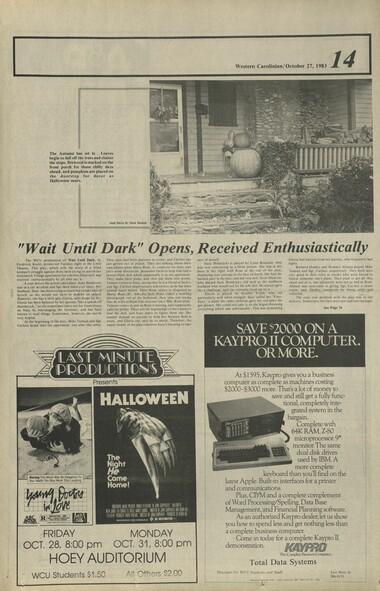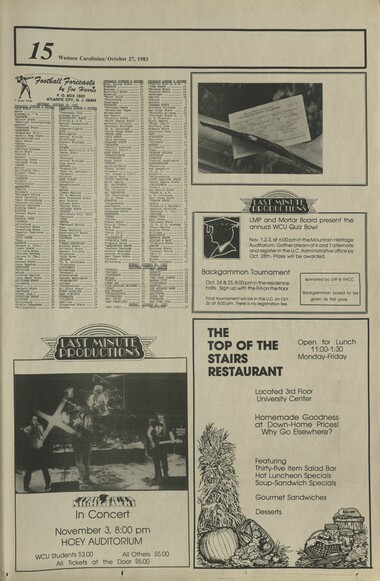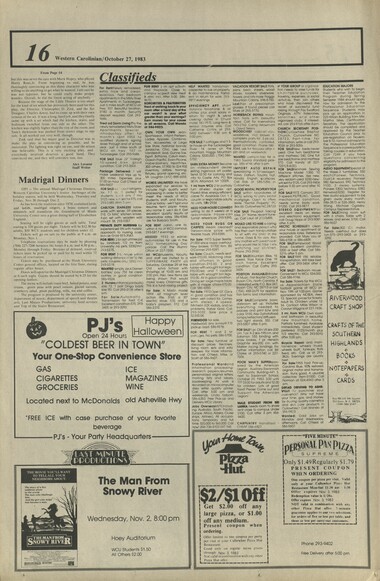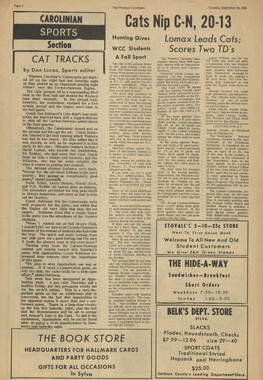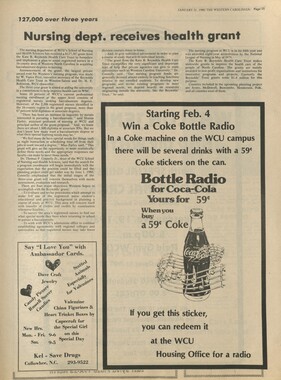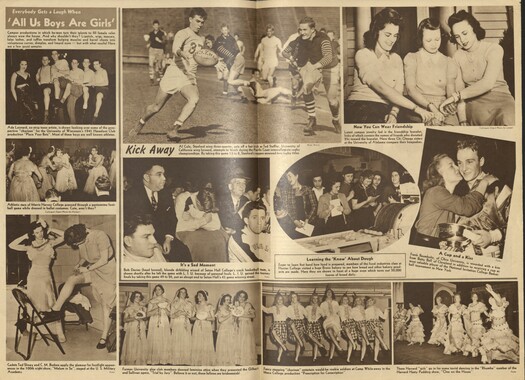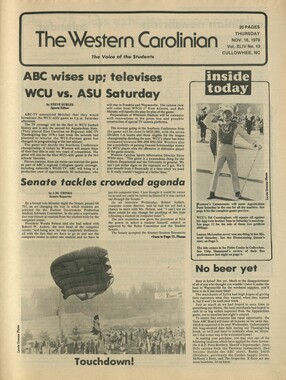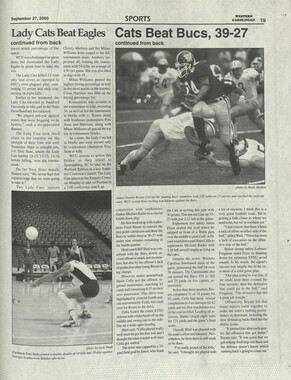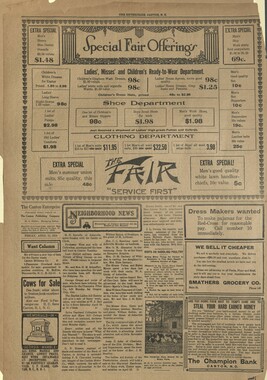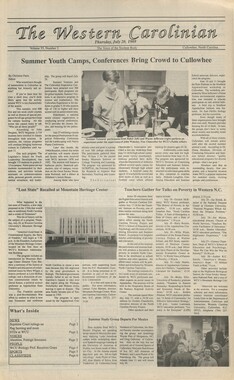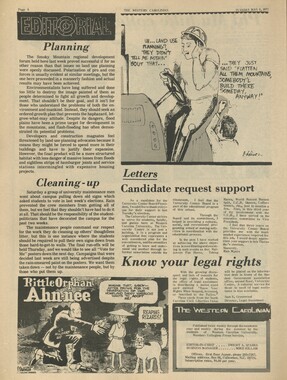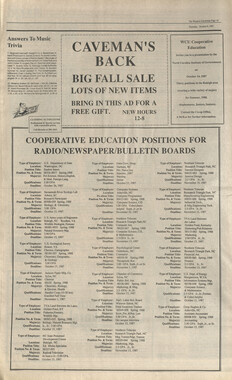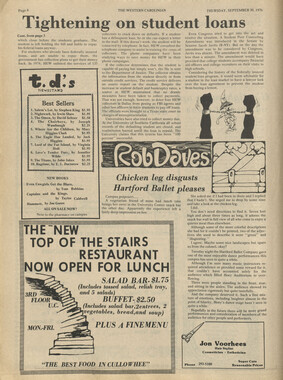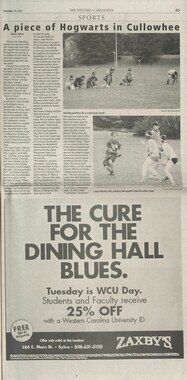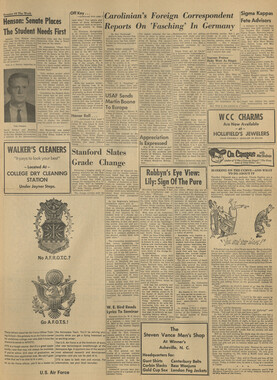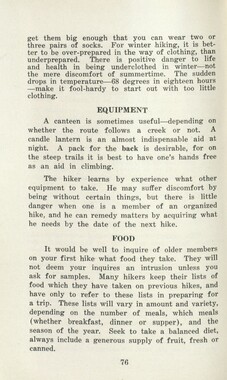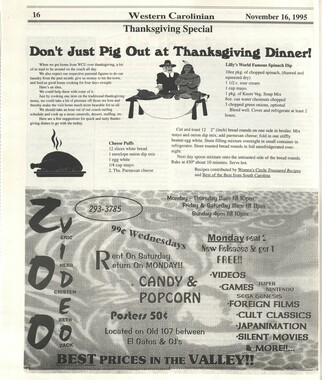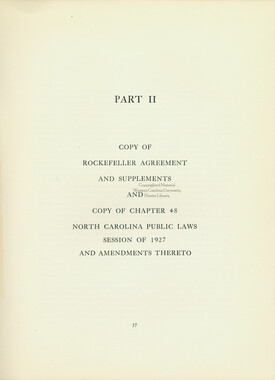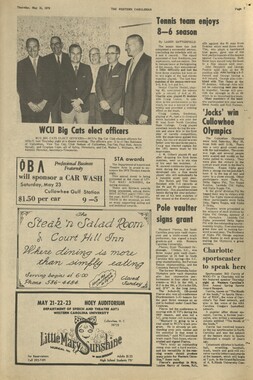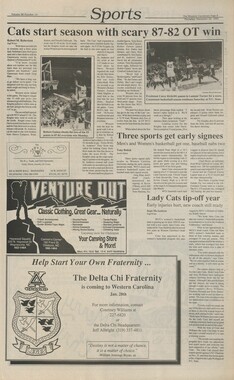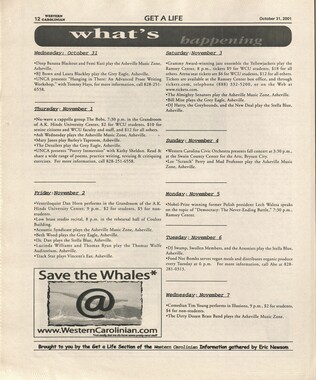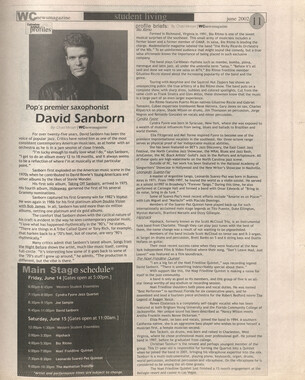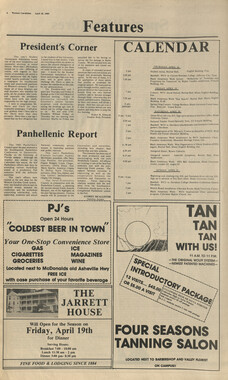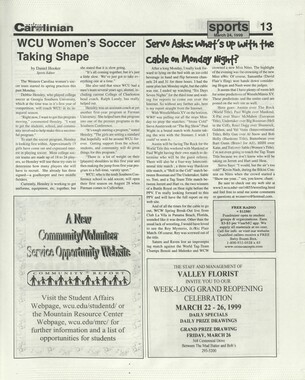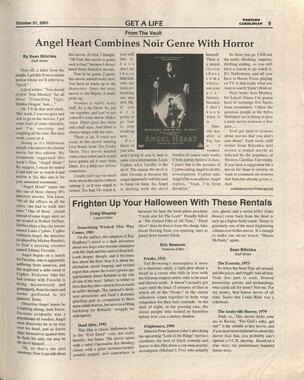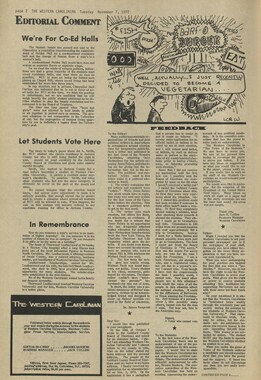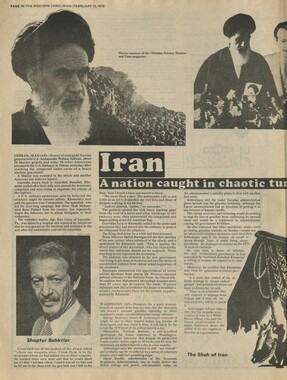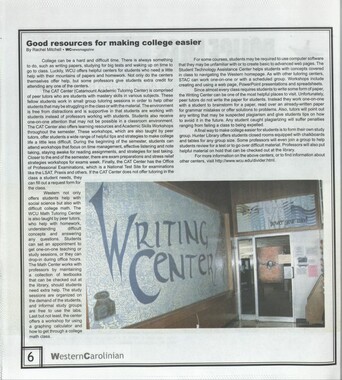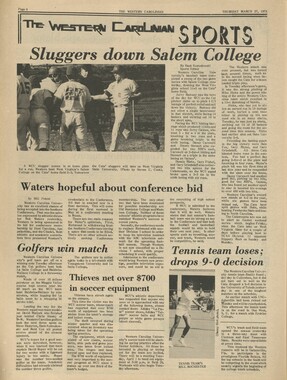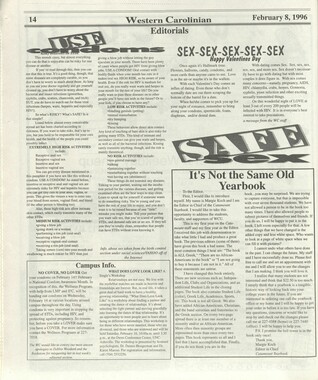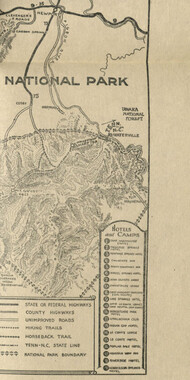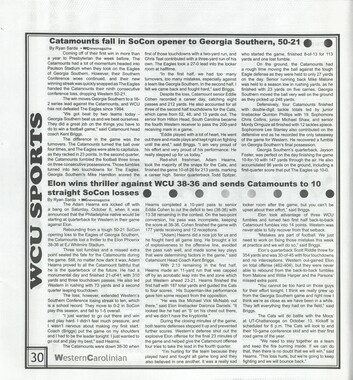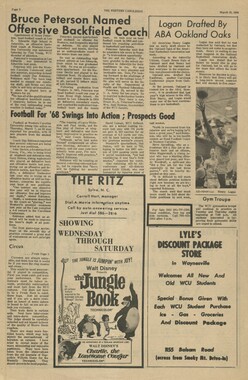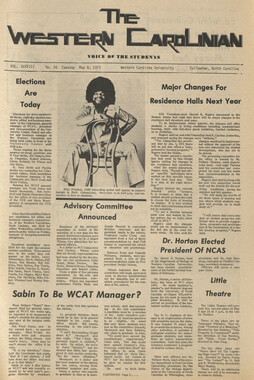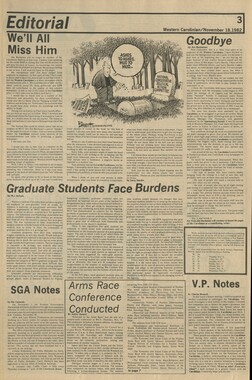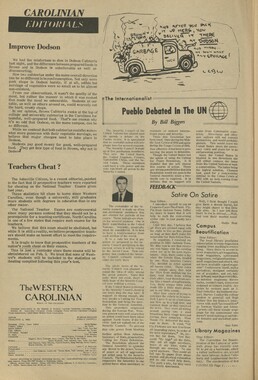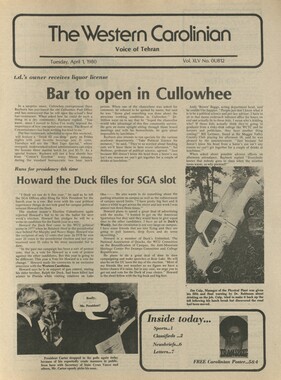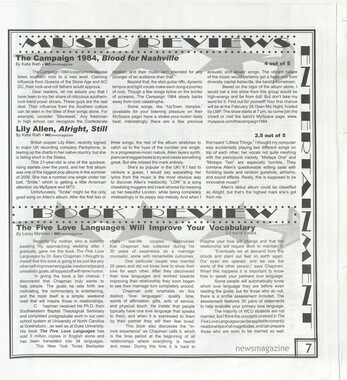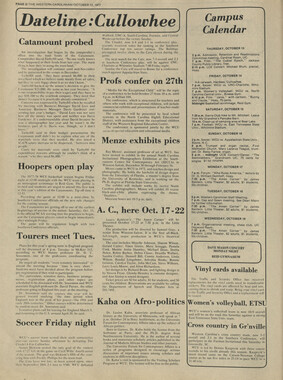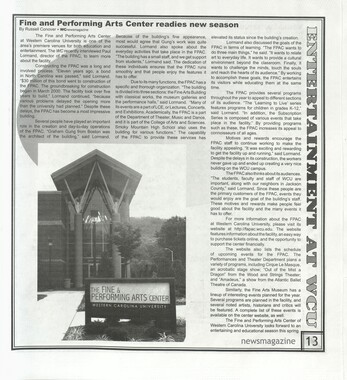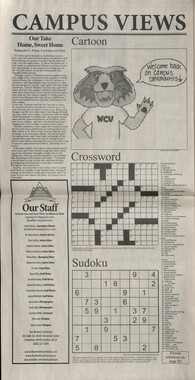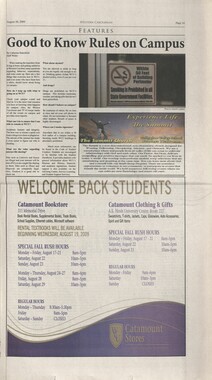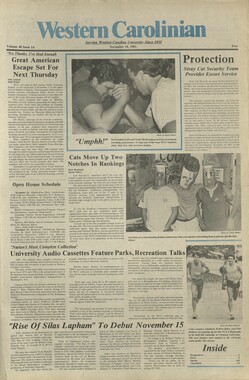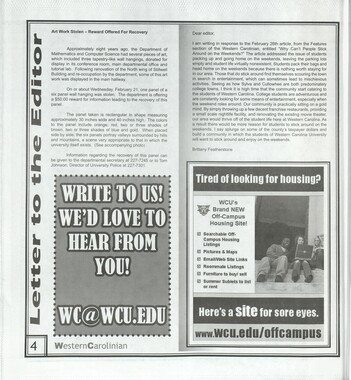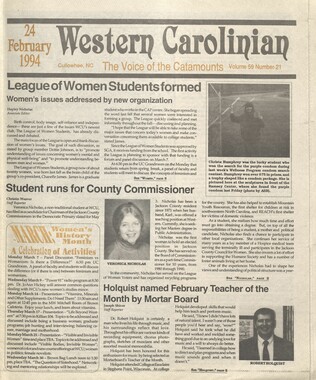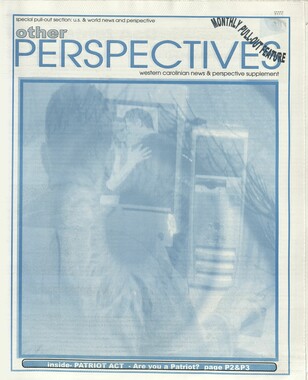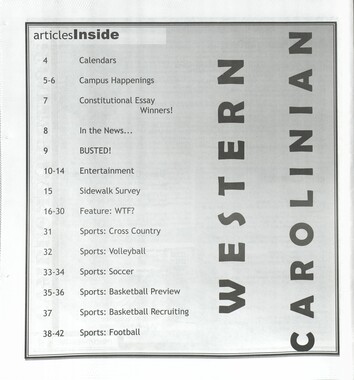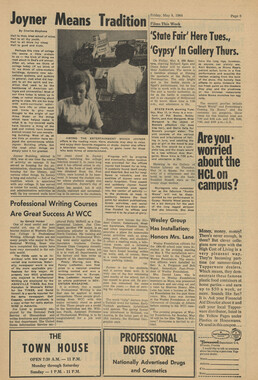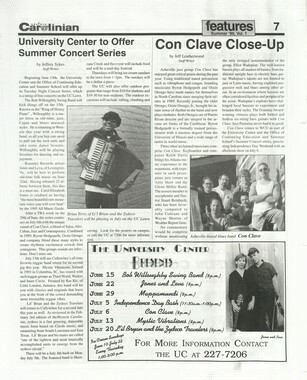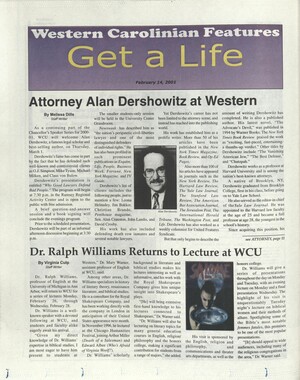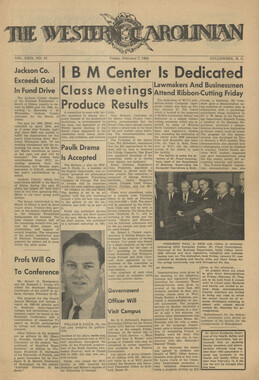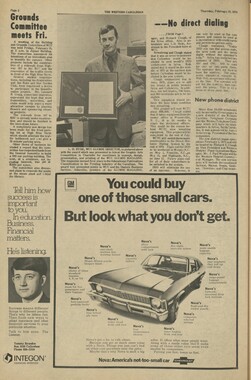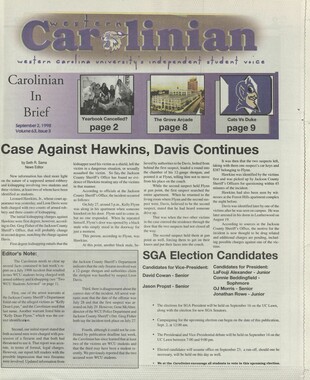Western Carolina University (21)
View all
- Canton Champion Fibre Company (2308)
- Cherokee Traditions (291)
- Civil War in Southern Appalachia (165)
- Craft Revival (1942)
- George Masa Collection (137)
- Great Smoky Mountains - A Park for America (3080)
- Highlights from Western Carolina University (422)
- Horace Kephart (973)
- Journeys Through Jackson (159)
- LGBTQIA+ Archive of Jackson County (89)
- Oral Histories of Western North Carolina (318)
- Picturing Appalachia (6617)
- Stories of Mountain Folk (413)
- Travel Western North Carolina (153)
- Western Carolina University Fine Art Museum Vitreograph Collection (129)
- Western Carolina University Herbarium (92)
- Western Carolina University: Making Memories (738)
- Western Carolina University Publications (2491)
- Western Carolina University Restricted Electronic Theses and Dissertations (146)
- Western North Carolina Regional Maps (71)
- World War II in Southern Appalachia (131)
University of North Carolina Asheville (6)
View all
- Allanstand Cottage Industries (62)
- Appalachian National Park Association (53)
- Bennett, Kelly, 1890-1974 (1463)
- Berry, Walter (76)
- Brasstown Carvers (40)
- Carver, George Washington, 1864?-1943 (26)
- Cathey, Joseph, 1803-1874 (1)
- Champion Fibre Company (233)
- Champion Paper and Fibre Company (297)
- Cherokee Indian Fair Association (16)
- Cherokee Language Program (22)
- Crowe, Amanda (40)
- Edmonston, Thomas Benton, 1842-1907 (7)
- Ensley, A. L. (Abraham Lincoln), 1865-1948 (275)
- Fromer, Irving Rhodes, 1913-1994 (70)
- George Butz (BFS 1907) (46)
- Goodrich, Frances Louisa (120)
- Grant, George Alexander, 1891-1964 (96)
- Heard, Marian Gladys (60)
- Kephart, Calvin, 1883-1969 (15)
- Kephart, Horace, 1862-1931 (313)
- Kephart, Laura, 1862-1954 (67)
- Laney, Gideon Thomas, 1889-1976 (439)
- Masa, George, 1881-1933 (61)
- McElhinney, William Julian, 1896-1953 (44)
- Niggli, Josephina, 1910-1983 (10)
- North Carolina Park Commission (105)
- Osborne, Kezia Stradley (9)
- Owens, Samuel Robert, 1918-1995 (11)
- Penland Weavers and Potters (36)
- Roberts, Vivienne (15)
- Roth, Albert, 1890-1974 (142)
- Schenck, Carl Alwin, 1868-1955 (1)
- Sherrill's Photography Studio (2565)
- Southern Highland Handicraft Guild (127)
- Southern Highlanders, Inc. (71)
- Stalcup, Jesse Bryson (46)
- Stearns, I. K. (213)
- Thompson, James Edward, 1880-1976 (226)
- United States. Indian Arts and Crafts Board (130)
- USFS (683)
- Vance, Zebulon Baird, 1830-1894 (1)
- Weaver, Zebulon, 1872-1948 (58)
- Western Carolina College (230)
- Western Carolina Teachers College (282)
- Western Carolina University (2008)
- Western Carolina University. Mountain Heritage Center (18)
- Whitman, Walt, 1819-1892 (10)
- Wilburn, Hiram Coleman, 1880-1967 (73)
- Williams, Isadora (3)
- Cain, Doreyl Ammons (0)
- Crittenden, Lorraine (0)
- Rhodes, Judy (0)
- Smith, Edward Clark (0)
- Appalachian Region, Southern (3032)
- Asheville (N.C.) (1945)
- Avery County (N.C.) (26)
- Blount County (Tenn.) (195)
- Buncombe County (N.C.) (1680)
- Cherokee County (N.C.) (283)
- Clay County (N.C.) (556)
- Graham County (N.C.) (238)
- Great Smoky Mountains National Park (N.C. and Tenn.) (525)
- Haywood County (N.C.) (3573)
- Henderson County (N.C.) (70)
- Jackson County (N.C.) (4925)
- Knox County (Tenn.) (35)
- Knoxville (Tenn.) (13)
- Lake Santeetlah (N.C.) (10)
- Macon County (N.C.) (421)
- Madison County (N.C.) (216)
- McDowell County (N.C.) (39)
- Mitchell County (N.C.) (135)
- Polk County (N.C.) (35)
- Qualla Boundary (982)
- Rutherford County (N.C.) (78)
- Swain County (N.C.) (2185)
- Transylvania County (N.C.) (270)
- Watauga County (N.C.) (12)
- Waynesville (N.C.) (86)
- Yancey County (N.C.) (72)
- Aerial Photographs (3)
- Aerial Views (60)
- Albums (books) (4)
- Articles (1)
- Artifacts (object Genre) (228)
- Bibliographies (1)
- Biography (general Genre) (2)
- Cards (information Artifacts) (38)
- Clippings (information Artifacts) (192)
- Copybooks (instructional Materials) (3)
- Crafts (art Genres) (622)
- Depictions (visual Works) (21)
- Design Drawings (1)
- Digital Moving Image Formats (2)
- Drawings (visual Works) (185)
- Envelopes (101)
- Exhibitions (events) (1)
- Facsimiles (reproductions) (1)
- Fiction (general Genre) (4)
- Financial Records (12)
- Fliers (printed Matter) (67)
- Glass Plate Negatives (381)
- Guidebooks (2)
- Internegatives (10)
- Interviews (823)
- Land Surveys (102)
- Letters (correspondence) (1045)
- Manuscripts (documents) (618)
- Maps (documents) (177)
- Memorandums (25)
- Minutes (administrative Records) (59)
- Negatives (photographs) (6090)
- Newsletters (1290)
- Newspapers (2)
- Notebooks (8)
- Occupation Currency (1)
- Paintings (visual Works) (1)
- Pen And Ink Drawings (1)
- Periodicals (194)
- Personal Narratives (10)
- Photographs (12977)
- Plans (maps) (1)
- Poetry (6)
- Portraits (4568)
- Postcards (329)
- Programs (documents) (181)
- Publications (documents) (2444)
- Questionnaires (65)
- Relief Prints (26)
- Sayings (literary Genre) (1)
- Scrapbooks (282)
- Sheet Music (2)
- Slides (photographs) (402)
- Songs (musical Compositions) (2)
- Sound Recordings (802)
- Specimens (92)
- Speeches (documents) (18)
- Tintypes (photographs) (8)
- Transcripts (329)
- Text Messages (0)
- A.L. Ensley Collection (275)
- Appalachian Industrial School Records (7)
- Appalachian National Park Association Records (336)
- Axley-Meroney Collection (2)
- Bayard Wootten Photograph Collection (20)
- Bethel Rural Community Organization Collection (7)
- Blumer Collection (5)
- C.W. Slagle Collection (20)
- Canton Area Historical Museum (2110)
- Carlos C. Campbell Collection (462)
- Cataloochee History Project (64)
- Cherokee Studies Collection (4)
- Daisy Dame Photograph Album (5)
- Daniel Boone VI Collection (1)
- Doris Ulmann Photograph Collection (112)
- Elizabeth H. Lasley Collection (1)
- Elizabeth Woolworth Szold Fleharty Collection (4)
- Frank Fry Collection (95)
- George Masa Collection (173)
- Gideon Laney Collection (452)
- Hazel Scarborough Collection (2)
- Hiram C. Wilburn Papers (28)
- Historic Photographs Collection (236)
- Horace Kephart Collection (861)
- Humbard Collection (33)
- Hunter and Weaver Families Collection (1)
- I. D. Blumenthal Collection (4)
- Isadora Williams Collection (4)
- Jesse Bryson Stalcup Collection (47)
- Jim Thompson Collection (224)
- John B. Battle Collection (7)
- John C. Campbell Folk School Records (80)
- John Parris Collection (6)
- Judaculla Rock project (2)
- Kelly Bennett Collection (1482)
- Love Family Papers (11)
- Major Wiley Parris Civil War Letters (3)
- Map Collection (12)
- McFee-Misemer Civil War Letters (34)
- Mountain Heritage Center Collection (4)
- Norburn - Robertson - Thomson Families Collection (44)
- Pauline Hood Collection (7)
- Pre-Guild Collection (2)
- Qualla Arts and Crafts Mutual Collection (12)
- R.A. Romanes Collection (681)
- Rosser H. Taylor Collection (1)
- Samuel Robert Owens Collection (94)
- Sara Madison Collection (144)
- Sherrill Studio Photo Collection (2558)
- Smoky Mountains Hiking Club Collection (616)
- Stories of Mountain Folk - Radio Programs (374)
- The Reporter, Western Carolina University (510)
- Venoy and Elizabeth Reed Collection (16)
- WCU Gender and Sexuality Oral History Project (36)
- WCU Mountain Heritage Center Oral Histories (25)
- WCU Oral History Collection - Mountain People, Mountain Lives (71)
- WCU Students Newspapers Collection (1923)
- Western North Carolina Tomorrow Black Oral History Project (69)
- William Williams Stringfield Collection (2)
- Zebulon Weaver Collection (109)
- African Americans (390)
- Appalachian Trail (35)
- Artisans (521)
- Cherokee art (84)
- Cherokee artists -- North Carolina (10)
- Cherokee language (21)
- Cherokee pottery (101)
- Cherokee women (208)
- Church buildings (190)
- Civilian Conservation Corps (U.S.) (111)
- College student newspapers and periodicals (2012)
- Dams (108)
- Dance (1023)
- Education (222)
- Floods (63)
- Folk music (1015)
- Forced removal, 1813-1903 (2)
- Forest conservation (220)
- Forests and forestry (1198)
- Gender nonconformity (4)
- Great Smoky Mountains National Park (N.C. and Tenn.) (181)
- Hunting (47)
- Landscape photography (25)
- Logging (122)
- Maps (83)
- Mines and mineral resources (9)
- North Carolina -- Maps (18)
- Paper industry (38)
- Postcards (255)
- Pottery (135)
- Railroad trains (72)
- Rural electrification -- North Carolina, Western (3)
- School integration -- Southern States (2)
- Segregation -- North Carolina, Western (5)
- Slavery (5)
- Sports (452)
- Storytelling (243)
- Waterfalls -- Great Smoky Mountains (N.C. and Tenn.) (66)
- Weaving -- Appalachian Region, Southern (280)
- Wood-carving -- Appalachian Region, Southern (328)
- World War, 1939-1945 (173)
Western Carolinian Volume 48 Number 12
Item
Item’s are ‘child’ level descriptions to ‘parent’ objects, (e.g. one page of a whole book).
-
-
Faw Touch Enhances Station Changes Joe Fournier Staff Writer Last year the student body of Western Carolina University elected Chris Faw as the new general manager .of WWCU, the campus radio station.This is his first year as the station's manager but Chris has worked his way up the ladder for almost four year now. Chris has been working at WWCU since his freshman year when he first came over the airwaves as a newscaster. He told me that when he walked into the door he found a friendly atmosphere and people wh were ready to show him the ropes. He was on the air within two weeks. Since then Chris has worked at WWCU as a disc jockey and music director and during his sophomore year he was program director. In an interview last' Thursday Chris remarked, "Program directing is my first love. Being general manager is more prestigious, but it's not as much fun." He has ambitions of someday being program director at a large station. Aside from his work at the station Chris enjoys playing the drums, swimming and water skiing. He also enjoys an impressive GPA. One of his roomates, Blaine Kellis, told me Chris has made the dean's list almost every semester since he came to Western. He also was an RA for three years. Chris' personal preference in music is rock and roll. His favorite musicians include Christopher Cross, Nightranger, and his all-time favorite. Earth, Wind and Fire. Chris' duties as general manager include deciding where and how the station's money is spent. All expenses are covered by SGA, the station's sponsor, and usually run around $27-28,000 annually. Most of that goes into equipment and maintenance. Last year for example, the station spent $8,000 on a new transmitter. They also recently purchased UP1 service for $4600 and are considering buying a $4500 stereo optimod which would give the station stereo capabilities. Other expenses include high telephone bills—partly because of networks and loops to other stations-subscriptions to trade magazines and some salaries. Chris feels that the station serves its listeners well. "If someone brings a public service announcement up here well do our best to get it on. We're just hungry for output." he told me. "Of course, we're going to get more complaints than other people because the radio reception around here is terrible. But in a way though that's good, because we don't have to compete with the 100,000 watt giants who hire $20,000 a year consultants, whereas we're just a bunch of kids feeling our way through it. I'd like people to listen to this station this year," he continued, "and see if they can hear a marked difference. I think there's a definite improvement this year, and 1 think the students are getting their money's worth. This is something somebody can use everyday even if they never come up here." Chris is also responsible for assigning jobs at the station, and disciplining those who do not do their job. "One thing I hope people get out of this is a knowledge of how a real radio station operates...this is so practical. It's something they can do everyday,and something they can use." "A lot of people that I've learned from were out in the 'real world'doing summer jobs and they would take the knowledge that they had and put it back into this place. This place has run like the real McCoy. When 1 got out into the 'real world' (Chris worked at WDEX this summer), I thought it would be different when in fact they were doing the same thing we were...so I had no problems making the transition. WeVe become more closely programmed like a commercial station whereas last year we were really head- SEC Team: Ronnie Faust, Mark Melrose, Cathy Welton, Luke Lael, Devin Dull, Kevin Haney (photo by Mark Haskett) SEC Team Fun, Professional Chris Faw, WWCU General Manager (Photo by Mark Haskett) on into music-taking chances. In other words, every time people turn on their radio they should hear a bona-fide hit song. The current format allows us the 30 minute music sweep. We've always had a lace for 30-minute music, but we never really played it up and said, 'Hey, here's 30 minutes of music' "We're trying to be more like a commercial station- more professional—and the big word we're stressing here is 'consistency'. We're not trying to play down the personalities ofthe DJ's but rather play up the music and the station." I asked Chris what his least favorite part of the job as general manager is. "I hearthe same complaints over and over again that I can't do anything about, "he said. "A lot of people ask "Why don't you carry the Catamount games?', but we can't carry the games because we don't own the rights to them. WWIT owns them." Since Chris graudates at the end of this academic year hell be leaving us to go into professional broadcasting. Thanks, Chris Faw for doing your part in making WWCU something to listen to. Marching Bands Of America Regionals Held A t WCU For Second Straight Year Heather Frey Staff Writer From the basement of Moore Building emanates the sound of WWCU 91 FM and its staff. But there is another team of dedicated professionals down there making noise: the Student Emergency Care Team. They are a fun-loving, professional unit of certified Emergency Medical Techni cians who are thoroughly dedicated to the job of helping people. The atmosphere is close-knit. friendly, and a little reminiscent of the famous 4077th, but there is no doubt as to the team being serious and competent when duty calls. SECT'S chief is Kevin Dull of Winston Salem. He started in emergency medical care in the fire service as a cadet when he was 14 years old. At the age of 18 he moved up to the local rescue squad and fire department, where he still works occasionally. Dull joined Western's SEC Team in his sophomore as a newly elected lieutenant. In the second semester ofthe same year he was voted captain. The next obvious step was chief, to which he was elected in his junior year, and where he has been ever since. He is well-respected by the other team members, even though Dull feels he's strict on them, always asking for more, wanting more professionalism on the scene. The toughest thing h,e has to deal with is a personnel problem. These are rare on the Hill, but clashes do happen. Mainly being chief "is a team function," Dull says. "Everybody has say-so in everything that's done. I don't say this is going to be done like this. It's more or less a moral majority. I'm no dictator. It's just that when something goes wrong, it comes to the chief. That's tions of the team is a very important duty ofthe chief. He also schedules call duty and stand-by. Dull works with the administration to get grants, and he schedules training sessions. In addition, he hands out and receives a little constructive criticism now and again. Second in command is Captain Ronnie Faust, who likewise started out as a cadet in EMS back in Winston-Salem when he was 15. Faust also works part-time in the emergency room ofthe Baptist Hospital there. His duties as captain are to oversee the equipment and make sure it's kept up- to-date. But he's allowed the privilege of making important decisions in the absence ofthe chief. Though rank doesn't mean a whole lot on the Hill when there isn't a lot of work going on, partner in an emergency. Faust said, "On the team we have right now, and I've been up here since the beginning of my sophomore year and I'm a senior now, weVe got one of the best qualified teams that I'veever seen." About Chief Dull pushing for more profession alsim, he agreed that it is a major issue. "If you're real slack and don't show a professional attitude, the by-standers are going to see that. And by showing professionalism it shows that we're qualified and able to give better care." Faust is a business major and hopes to go into hospital administration. He'd like to stay in the business field, but in a hospital environment. The options are open. Cathy Welton is the Kevin Whiteside Staff Writer Once upon a time there was a man by the name of Larry McCormick who was a percussionist and a public school teacher. This man was very supportive of high school marching band contests and because of his love for kids he constructed a contest which is now known as Marching Bands of American or MBA. Now a part of McCormick Enterprises, which sells anything a marching band need, M BA is one of the most prestigious marching band contests in the United States. How is it different from all of the other band ^contests? You can bet that at an MBA contest a person will experience some of the toughest shows that a high school band can perform. And not only perform, but perform exceptionally well. There are some ofthe most complex marghing band shows anywhere. MBA was first held in Whitewater, Wisconsin about 7 years ago. The contest holds different regionals all over the United States throughtout the year—ending with Winter and Summer Nationals. The M BA Nationals will be held at East Tennessee State University for its third year there. Western Carolina University has hosted the MBA Southern Regionals for the second year now. How do we pay for hosting this contest? Simple, we don't! McCormick Enterprises sponsors the whole show and offers a lot of students to compete in a very demanding contest and to also experience the beauty of WCU. All of the competing bands get to see WCU's Marching Catamounts perform which shows them a touch of the fine Music Department here. The competing bands are put into three classes; 1A, 2A, and Open Class. Class rank is determined by the band's school population. The band's mainly enter the regionals to get input and output from the judges so they'll be ready for the Nationals. And it's a good step before the Nationals because of all of the excellent shows competing. These bands can work 2 to 3 Vi hours a day, 5 days a week and still make mistakes. That's not even counting the extra work that the Auxiliary Corps do. Danville High School—a competitor in this year's Southern Regionals—has been doing the same show for 5 years! They won the Southern Regionals last year and if your show wins then why change it! All ofthe shows are, in a sense, commercialized a lot. Most of them have had Professional Music Arrangers and professional marching band writers to write their show. But there still are a few of the show's that the band directors themselves wrote. WCU's fine ha^f-time show is written by our own Dr. Scagnoli, who is Director of Bands here. It is from his interview with me that a lot of this article is derived. What do you win in MBA? Well, besides the prestigious title, bands win elaborate, beautiful trophies and medals. A lot of bands get superb reputations by winning this contest also. MBA also supplies the individual band's high school with about $1,000.00 worth of tickets for half price. Then the students sell the tickets for the original cost, make their money back, and then attend the contest free of charge. This year at MBA there were 13 bands competing compared to about 18 bands last year. The bands competing and representing their respective high schools were: East Lincoln, Glen Ridge. Northwest Guilford, South Granville, Boiling Springs, Fort Mill, Brevard, Rocky Mount, Campbell, Tuscola, and Danville. All of these bands have excellent shows. The big winner was Rocky Mount Senior High School, who also won the 1A Division last year. Danville High School won in the 1A Division and Tuscola won in the Open Division. Some of the individual band awards were: Drum Major-South Granville, Flags-Fort Mill, Rifles-Fort Mill, Overall Auxiliary-Fort Mill, Best Overall Marching—Danville, Brass and Winds—Rocky Mount, Percussion—Rocky Mount, and General Effect Trophy- Rocky Mount. WCU's band will host their own Mountain Classic Marching Band Contest (MCMBC), here October 15, so if you missed MBA. be sure and attend this contest. Because the marching band experience can be one of the most total and significant educational events in the development of a young person. Marching Bands of America was formed and exists to create, support and serve this experience. An individual's choice to participate in the band, and that band's participation in the broadening experience of competition, is a positive step toward becoming "a winner in life." Marching Bands of America is about participation. It is a space where all who participate are winners. It provides the opportunity to acknowledge young people who choose to win by dedicating themselves to a purpose. MBA is also about the promotion of excellence, the job of participating and "putting it all on the line," improvement, growth, and the acknowledge and satisfaction that comes from "going for it." and knowing that you've done your best. MBA's purpose is to create and support an environment large enough to reach all the young people in this country who choose to become winners in life. peace and quiet is relaxing and she loves the family atmosphere at SECT. Welton is from Char lotte where she first got interested in EMC by a friend who was teaching an EMT class. She got her certification there and found out about SECT after she arrived on campus. To date, she has been a member for almost a year. Luke Lael is the youngest member of SECT. •Also from Winston-Salem, he too spent some time part of the job." So, for the . it's like family. "1 consider it only girl on the team, but no 1 working for the fire team, most part, personnel .like we're all living in a great one seems to set her apart but has always wanted to problems are avoided, big apartment with six because of her sex. In fact. Communication is open, 'rooms," Faust commented, she admitted, "Most of the Any team member knows he adding, "We all get along time I just feel these are just can go to the chief with a problem and it'll most likely get resolved. Overseeing the fune really well up here." That's very important, because each SECT member must know he can count on his my real dear friends." She gets along with the guys like a sister and says she doesn't miss living in the dorms. The work on an ambulance team. "It's good training to fall back on if I can't find a job in my major" which is industrial technology. Besides, he likes the work; it makes him feel "pretty good." Lael added, "I'm hoping every time I go on a call I'm doing something for somebody. If I've helped to save somebody's life, it makes me feel a lot better. It makes me feel like I want to do it again." There are rewards, but there are sacrifices SECT members make. Living on the Hill is a bit isolated and the work keeps Lael busy. There's not a lot of time for socializing and the only time he really sees any other students is when he's in class, and he winds up working at most of the school activities. But he still enjoys what he's doing and is looking forward to the future and its challenges. Kevin Haney is the team's lieutenant and is majoring in emergency medical care. He likes being a "public servant" and plans , to make it his career. Like Cathy Welton. Haney doesn't miss living in the dorms. He lived there for three years and feels that by living with the team hell come to know his team mates much better. After graduation in May. Haney plans to work as a paramedic at leat for a few years. After that he'd like to go into administra tion. Right now he's concerned with the team and is pleased that everyone is pushing forward, trying to get better. He said that's good, and "it makes the team look good." Finally, there's Mark Melrose, who calls himself "just a peon." In reality, he's the team's water rescue expert. He and Chief Dull both feel it necessary that the team should learn how to rescue people from water without endangering themselves. SECT is learning how to do rescues where people are caught in the hydraulics of a dam, and how to get canoers out from under rocks by using different rope techniques. This past summer Melrose worked for the Nantahala Outdoor Center as a river guide. While there he became a licensed American Canoe Associa tion Instructor and attended clinics in water rescue, something he thought would definitely benefit the team. He's in the process of planning some drills to test what team members know.
Object
Object’s are ‘parent’ level descriptions to ‘children’ items, (e.g. a book with pages).
-
The Western Carolinian is Western Carolina University's student-run newspaper. The paper was published as the Cullowhee Yodel from 1924 to 1931 before changing its name to The Western Carolinian in 1933.
-
